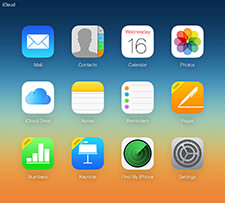iCloud
iCloud is an online service provided by Apple. It provides an email account, online storage, and backup services. It also allows you to share data between devices, such as Macs, iPhones, and iPads.
Below is a list of features included with iCloud:
- Mail – an email account that can be automatically configured on Apple devices and accessed via Apple's webmail interface; iCloud email addresses end with mac.com, me.com, or icloud.com.
- Contacts – your address book is stored in the cloud and can be synced across your all your devices.
- Calendar – you can store one or more calendars online and sync the events across your all your devices.
- Photos – Apple's Photo Stream automatically stores your recently captured photos in iCloud. You can also use iCloud Photo Library to store all your images on iCloud and sync them across your devices.
- iCloud Drive – an online storage area where you can save and download all types of files.
- Notes – you can jot down notes on one device and view them on another one.
- Reminders – when you set a reminder it will show up on all devices connected to your iCloud account.
- Find My iPhone – a service that allows you to locate all your Apple devices, such as your iPhone, iPad, or MacBook.
Several Apple applications support iCloud, meaning you can save a document from one device and open and edit it on another one. For example, you can create a presentation using Apple Keynote on an iMac, save it in iCloud, then open it on your iPad at a later time. The primary apps that support iCloud include Pages (word processing documents), Numbers (spreadsheets), and Keynote (presentations). iCloud includes web-based versions of these applications as well.
Apple's iCloud service is free to use and can be accessed using an Apple ID on any supported device. If you need additional online storage, you can purchase extra storage space for a monthly fee.
NOTE: iCloud is an evolution of Apple's cloud computing services. Previous versions include iTools (2000), .Mac (2002), and MobileMe (2008). iCloud, which replaced MobileMe, was launched in 2011.
 Test Your Knowledge
Test Your Knowledge